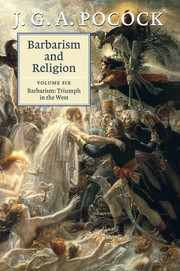Description
Barbarism and Religion: Volume 6, Barbarism: Triumph in the West
Author: Pocock J. G. A.
The sixth and final volume in an acclaimed series situating Edward Gibbon in a series of contexts in eighteenth-century European history.
Language: English
Subject for Barbarism and Religion: Volume 6, Barbarism: Triumph in...:
Approximative price 32.87 €
In Print (Delivery period: 14 days).
Add to cart
Barbarism and Religion: Volume 6, Barbarism: Triumph in the West
Publication date: 03-2018
Support: Print on demand
Publication date: 03-2018
Support: Print on demand
Approximative price 119.03 €
In Print (Delivery period: 14 days).
Add to cart
Barbarism and Religion: Volume 6, Barbarism: Triumph in the West
Publication date: 05-2015
539 p. · 16x23.5 cm · Hardback
Publication date: 05-2015
539 p. · 16x23.5 cm · Hardback
Description
/li>Contents
/li>Biography
/li>
This sixth and final volume in John Pocock's acclaimed sequence of works on Barbarism and Religion examines Volumes II and III of Edward Gibbon's Decline and Fall of the Roman Empire, carrying Gibbon's narrative to the end of empire in the west. It makes two general assertions: first, that this is in reality a mosaic of narratives, written on diverse premises and never fully synthesized with one another; and second, that these chapters assert a progress of both barbarism and religion from east to west, leaving much history behind as they do so. The magnitude of Barbarism and Religion is already apparent. Barbarism: Triumph in the West represents the culmination of a remarkable attempt to discover and present what Gibbon was saying, what he meant by it, and why he said it in the ways that he did, as well as an unparalleled contribution to the historiography of Enlightened Europe.
Introduction; Part I. The Constantinian Empire: 1. Constantinople: a new city and a new history; 2. Constantine to Julian: the disintegration of a dynasty; Part II. The Church in the Empire: 3. Constantine's second revolution; 4. Theology and the problems of authority; 5. Nicaea and its aftermath; 6. The reign of Constantius and the Arian triumph; 7. The structure of chapter 21; Part III. The Interlude of Julian: 8. Gibbon and Julian: the history of an anomaly; 9. Julian apostate: the failure of an alternative; 10. Julian as persecutor: from toleration to the failure of repression; 11. The sojourn at Antioch and the Persian disaster; Part IV. Barbarism: The First Catastrophe: 12. Valentinian I and Valens: the turn to the west; 13. The geography and history of the western Decline and Fall; Part V. The Triumph of Orthodoxy and the Last Emperor: 14. The reign of Theodosius: triumphs preceding disaster; 15. Ambrose of Milan: the church and the empire; 16. Theodosius narrated and re-narrated: the death and rebirth of polytheism; Part VI. The Barbarisation of the West; 17. The Gothic phase: the sack of Rome and the loss of the transalpine west; 18. Vandals and Huns: the twin empires and the loss of Africa; 19. Attila and Aetius: the Hun invasions of the west; 20. The end of the western succession; Part VII. After the Fall: Towards a History Not Written: 21. Ends and beginnings: the conclusion of Gibbon's third volume; 22. The barbarian kingdoms and their laws: the beginnings of a mediaeval history; 23. The general observations; 24. Gibbon's first trilogy and its successor volumes; Conclusion of the present series; Bibliography; Index.
J. G. A. Pocock was educated at the Universities of Canterbury and Cambridge. He is now Harry C. Black Professor of History Emeritus at The Johns Hopkins University and an Honorary Fellow of St John's College, Cambridge. His many seminal works on intellectual history include The Ancient Constitution and the Feudal Law (1957, second edition 1987), Politics, Language and Time (1971), The Machiavellian Moment (1975, second edition 2003), Virtue, Commerce and History (1985), Political Thought and History (2009), and five previous volumes in the Barbarism and Religion sequence, initiated in 1999. He has also edited The Political Works of James Harrington (1977) and Burke's Reflections on the Revolution in France (1987), as well as the collaborative study The Varieties of British Political Thought (1995). A Corresponding Fellow of the British Academy and of the Royal Historical Society, Professor Pocock is also a member of the American Academy of Arts and Sciences and of the American Philosophical Society. He was appointed an Officer of the Order of New Zealand Merit in 2002.
© 2024 LAVOISIER S.A.S.

